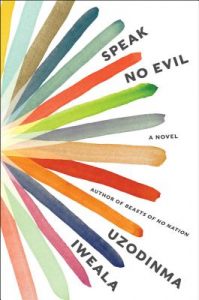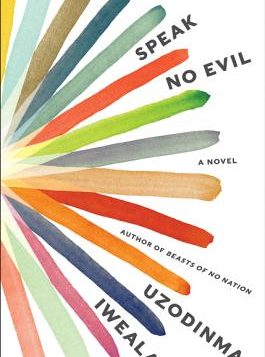 Speak No Evil
Speak No Evil
by Uzodinma Iweala
Harper. 215 pages, $26.99
UZODINMA IWEALA’S powerful, timely novel, Speak No Evil, tells two interrelated stories, told from each of the main characters’ point of view. The first concerns a young man of Nigerian descent grappling with his homosexuality while growing up in a culture that condemns it and tries to “cure” him. The second details his white female friend, who tries her best to help him navigate this complicated world but instead sets events in motion that lead to tragedy. It is a sad reminder that, for all our progress, there are still places and families that have real problems accepting nonconforming sexualities.
In Niru’s section, he is a seemingly successful high school senior living in an affluent section of Washington, D.C., attending a prestigious private school. Academically and athletically talented, he earned early admission to Harvard and is counting down to graduation. But one winter day, he shares with his best friend Meredith that he is gay. Meredith, having tried to sleep with Niru earlier, downloads Grindr and Tinder onto his phone. His father finds Niru’s phone, and before long they’re on their way to Nigeria to remove the “demon” of homosexuality. Niru and Meredith’s friendship is strained on his return, while Niru begins secretly seeing a young man. He struggles with his feelings, only to have everything fall apart in one terrible moment.
In her section, many years later, Meredith remembers what happened when she returned to Washington to help her parents move out of their home. She struggles with her guilt over this incident and its aftermath, which affected her relationship with her parents. She does what she can to make amends.
Iweala perfectly captures the conflicting feelings of a closeted teenage boy as desire fights against fear. Niru thinks his boyfriend Damien’s “hard, bare stomach … feels so good,” even as he pulls away from Damien, saying “this is all wrong, all so wrong.” Earlier in the novel, having arranged to meet a boy for coffee, Niru considers canceling their plans, giving the excuse of something coming up, to avoid temptation.
Given his father’s reaction when he discovers Niru’s texts, it’s no wonder he is terrified to act on his desires. The novel reflects the vast cultural divide between Niru, born and raised to prosperity in America, and his father, who grew up impoverished in Nigeria and suffered through the civil war there. Even while achieving success in America, Niru’s parents remain unassimilated, cooking traditional food and attending an evangelical church in Washington. Niru finds his family’s regular travels to Nigeria difficult, not just because of the oppressive heat and unfamiliar odors, but also from witnessing the strange mixture of pride and shame his father feels for his homeland. His father’s rage at Niru’s homosexuality is palpable: he slams the boy against the wall while screaming at him. The religious ceremony performed for Niru in Nigeria is also terrifying, as Niru has no idea what might happen, or how far they will go to “save” him.
A short, well-paced novel, Speak No Evil uses Niru and Meredith’s stories as a dramatic way of exploring issues of sexuality, race, class, and privilege. Niru’s tale feels more immediate, perhaps because it is told in the present, while Meredith’s is told as a memory of past events. Still, anyone who has wrestled with their sexuality, or loved someone in the closet either romantically or as a friend, will find much to relate to in this book.
________________________________________________________
Charles Green is a writer based in Annapolis, Maryland.






